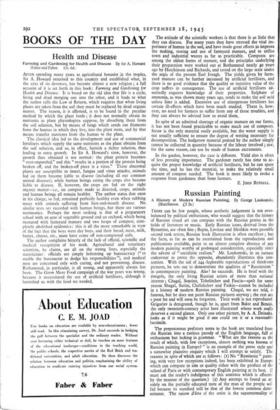BOOKS OF THE DAY
Health and Disease
Farming and Gardening for Health and Disease. By Sir A. Howard. ( Faber and Faber. 12s. 6d.) AFTER spending many years as agricultural botanist kt the tropics, Sir A. Howard returned to this country and established what, in the eyes of its devotees, has become almost a new religion ; a full account of it is set forth in this book: Farming and Gardening for Health and Disease. It is based on the old idea that life is a cycle, living and dead merging one into the other, and it leads to what the author calls the Law of Return, which requires that when living plants are taken from the soil they must be replaced by dead organic matter. The reason, it is affirmed, is to be found in the peculiar method by which the plant feeds ; it does not normally obtain its nutrients as plant physiologists suppose, by absorbing them from the soil solution, but by means of fungi which sends out filaments from the humus in which they live, into the plant roots, and by that means transfer nutrients from the humus to the plant.
The classical idea led to the development and use of commercial fertilisers which supply the same nutrients as the plant obtains from the soil solution, and so, in effect, furnish a richer solution, thus leading to extra growth. In Sir A. Howard's view, however, the growth thus obtained is not normal: the plant protein becomes " over-expanded," and this " results in a portion of the protein being broken off, and the broken-off piece is a virus." These abnormal plants are susceptible to insect, fungus and virus attacks; animals fed on them become liable to disease (including all our common animal diseases), while human beings eating the crops also become liable to disease. If, however, the crops are fed on the right organic matter—i.e., on compost made as directed, crops, animals and human beings all remain healthy. The author states that oxen in his charge, so fed, remained perfectly healthy even when rubbing noses with animals suffering from foot-and-mouth disease. No. similar tests are recorded with human beings, but there are various testimonies. Perhaps the most striking is that of a preparatory school with an acre of vegetable ground and an orchard, which being manured with farmyard manure and two heaps of compost, com- pletely abolished epidemics: this is all the more remarkable in view of the fact that the boys were day boys, and their bread, meat, milk, butter, cheese, etc., must have come off non-composted soils. The author complains bitterly of the lack of official, scientific and medical recognition of his work. Agricultural and veterinary scientists, he claims, are all on the wrong lines, especially the statisticians : officials are simply bolstering up bureaucracy (" to enable the bureaucrat to dodge his responsibilities"), and medical men are concerned only with curing, and not preventing, disease. Rothamsted, in particular, is all wrong, and apparently always has been. The Grow More Food campaign of the war years was wrong, because it necessitated the use of artificial fertilisers, although it furnished us with the food we needed.
The attitude of the scientific workers is that there is so little that they can discuss. For many years they have stressed the vital im- portance of humus in the soil, and have made great efforts to improve the making, storing and use of farmyard manure, and to utilise town and industrial wastes as far as practicable. Composts are among the oldest forms of manure, and the principles underlying their preparation were worked out at Rothamsted nearly 4o years ago by Hutchinson and Richards, and tested on the large scale under the aegis of the present Earl Iveagh. The yields given by farm- yard manure can be further increased by artificial fertilisers, and there is no good evidence that the quality or nutritive value of the crop suffers in consequence. The use of artificial fertilisers ad- mittedly requires knowledge of their properties. Sulphate of ammonia, as was shown many years ago, tends to make the soil acid unless lime is added. Excessive use of nitrogenous fertilisers has certain ill-effects which have been much studied. There is, how- ever, no need for farmers to suffer from any of these troubles, and they can always be advised how to avoid them,
In spite of an admitted shortage of organic manure on our farms, it has not 'been found practicable to make much use of composts. Straw is the only material easily available, but the water supply is not usually sufficient to ensure the degree of wetting necessary for decomposition. The hedgerow material praised by the author simply cannot be collected in quantity because of the labour involved ; nor, for the same reason, can use be made of human excrements.
In the garden, however, the case is different. Yield also is often of less pressing importance. The gardener rarely has time to ac- quire the proper knowledge of artificial fertilisers, but he can spare the time, and he has the material, to make the relatively small amount of compost needed. The book is more likely to evoke a response from gardeners than from farmers.
E. JOHN RUSSELL.


























 Previous page
Previous page